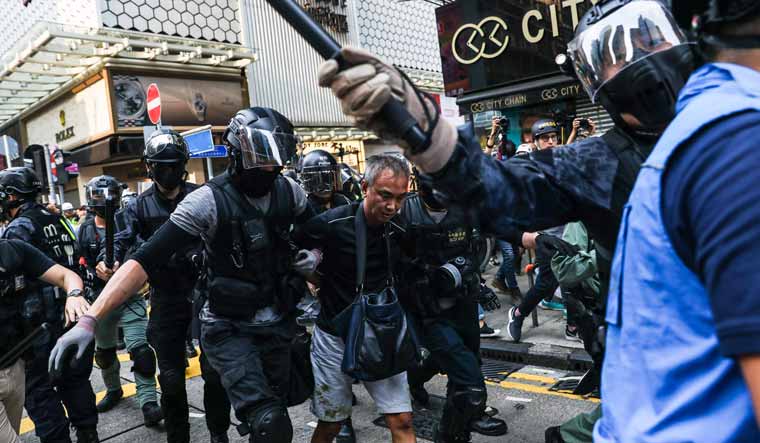Beijing has said that it will not tolerate any challenge to Hong Kong's governing system. It has also said that it would brook no foreign interference in Hong Kong affairs as it discussed the unrest in the semi-autonomous city at a major, four-day meeting of the Communist Party chaired by President Xi Jinping, according to a senior party cadre. China has laid out plans to boost patriotism in the city and change how its leader is chosen or removed after months of pro-democracy protests.
The central government in Beijing had so far voiced its confidence in Hong Kong chief executive Carrie Lam and the city police to put a lid on the increasingly violent protests. But all eyes have been on whether the party leadership will assert more control over the situation if the demonstrations spin out of control.
In the meantime, 200 pro-democracy supporters, from high-profile activists to journalists and lawmakers, seen as supporting Hong Kong's protest movement have been "doxxed" by the site, HK Leaks, since it emerged in August. Their personal details have been posted online using Russia-based servers being promoted by powerful groups linked to China's ruling Communist Party and it seems like there is almost no way to stop it.
China's act of 'doxxing' pro-democracy protesters and leaders comes after Beijing banned revealing information of police officials online. The ban was put in place to shield the identity of officers as they clash with protesters. The police force says many of its officers have had personal details leaked online and family members have been harassed at the hands of the protesters as a result.
Many of the tweets used emoji in their hashtags or were strategically edited to avoid being flagged.
Some pro-democracy victims of doxxing have accused mainland Chinese authorities of involvement.
For nearly five months now, the former British colony has been rocked by protests with citizens spoofing the city's pro-Beijing leaders and erosion of basic rights. Shen Chunyao, director of the Hong Kong, Macau and Basic Law Commission, said party leaders at the meeting in Beijing agreed to “further improve the central government's system of governance over the region” and maintain its “long-term prosperity and stability”.
He said that China would “never tolerate any act” that aims to split the country or endanger national security.
Amid speculation that Beijing might be prepared to intervene if necessary, Elements of the People's Armed Police were deployed over the summer in Shenzhen, the city bordering Hong Kong.
The paramilitary group were conducting drills with assault rifles fitted with bayonets at a sports stadium in Shenzhen on Thursday. Currently, Hong Kong's chief is not directly elected. And this has been a point of contention among the protesters. It is also a source of major friction and a headache for the leaders themselves because they have no popular mandate. The city's leader is chosen by a 1,200-strong committee that is stacked with Beijing loyalists.
And while over the months of protests, Beijing has backed Hong Kong's Chief Executive Carrie Lam, it is now planning to replace her as leader of the semi-autonomous city, that is currently facing recession due to the protests. Beijing officially announcing to repeal the extradition bill that triggered the protests in the first place has not done much to quell the protests. Besides demanding that Lam steps down, protesters also want an independent inquiry into the brutality of police actions that have been used against the protesters. Pro-democracy leaders have been detained and question for no apparent reason and they have used tear gas bombs, rubber bullets and water cannons to disperse protests.
Beijing Wednesday expressed “approval and support” for the disqualification of Hong Kong democracy activist Joshua Wong from upcoming local elections. Wong, one of the most prominent figures in the otherwise leaderless pro-democracy movement, accused the Hong Kong government of “political screening” after an election officer ruled his nomination for the November poll invalid on Tuesday. Another thing the protesters hope to achieve no-screening of political candidates to be elected to the legislature and a truly democratic model to elect the city's leader.
The Communist party elite decided this week to step up patriotic education as a way to curb youth-led protests. According to Shen, Hong Kong officials and teenagers should learn about the constitution. The party aims to “strengthen the national consciousness and patriotism of Hong Kong and Macau compatriots through the education of history and Chinese culture,” he added. When Beijing tried to beef up patriotic education in 2012, it faced a huge backlash from Hong Kong students.
Pro-democracy lawmaker Claudia Mo said that these promises from Beijing are merely 'lip service' and that "Hong Kongers will not take this issue lying down."


